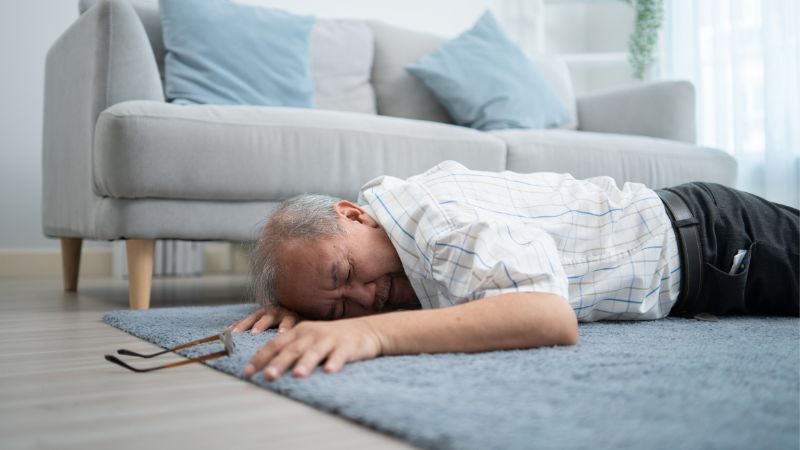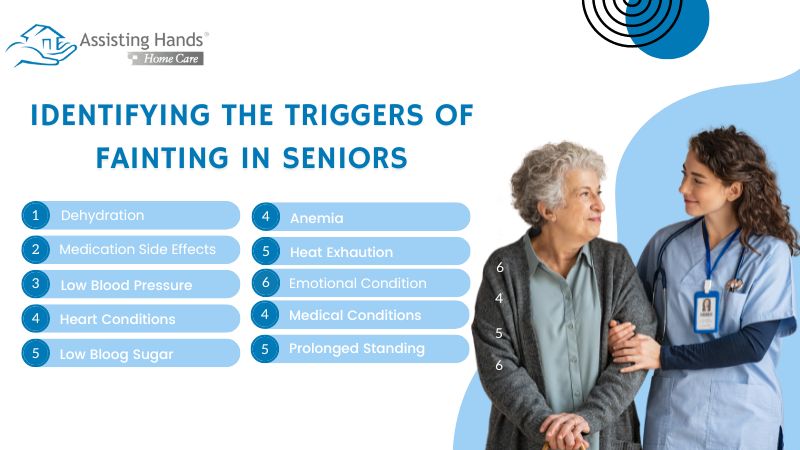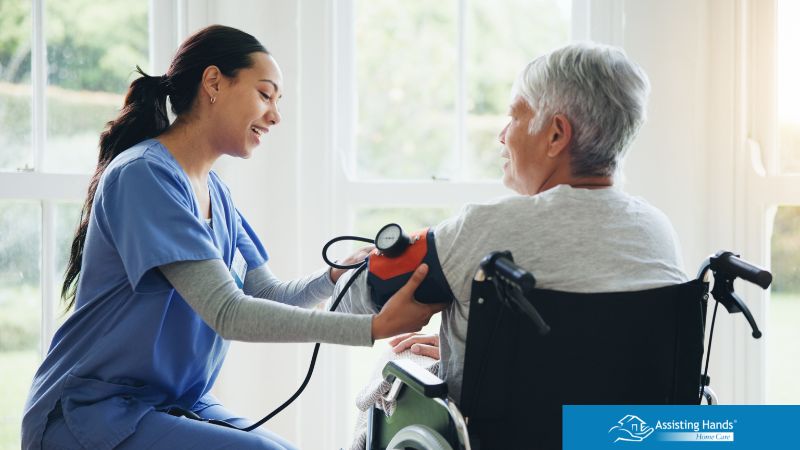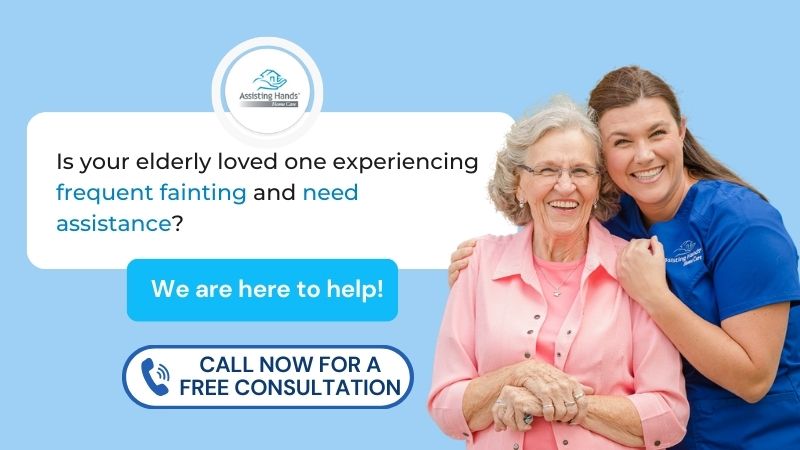

Fainting can be a frightening experience, especially when it involves a senior citizen. If you’ve ever witnessed an elderly loved one suddenly lose consciousness, you know just how alarming it can be. For many seniors, fainting spells can happen unexpectedly and may be indicative of underlying health issues that require attention. Understanding how to respond effectively in these moments is not only essential for their immediate safety but also important for their long-term health and well-being.
As we age, our bodies undergo various changes that can increase the likelihood of fainting. Factors such as dehydration, medication side effects, and sudden shifts in posture can all contribute to episodes of syncope. This makes it necessary for family members and caregivers to be equipped with knowledge about why fainting occurs and how to respond when it does.
In this blog, we’ll go over what to do if a senior citizen faints at home, the common reasons for fainting, and steps you can take to help prevent it. With this knowledge, you can be better equipped to support your loved ones during a scary situation and keep them safe at home.
Identifying the Triggers of Fainting in Seniors
Fainting, or syncope, is a sudden loss of consciousness that can be particularly concerning in seniors. Understanding the common triggers can help caregivers and family members recognize the signs and respond appropriately. Here are some key reasons why seniors may experience fainting:

- Dehydration: As people age, their bodies may become less efficient at managing fluids. Seniors may not drink enough water, leading to dehydration, which can cause fainting due to lowered blood volume.
- Medication Side Effects: Many seniors take multiple medications for various health conditions. Some medications can cause dizziness, lightheadedness, or low blood pressure, increasing the risk of fainting.
- Low Blood Pressure: Seniors are more prone to orthostatic hypotension, where blood pressure drops suddenly when standing up. This can lead to dizziness or fainting as the body struggles to adjust.
- Heart Conditions: Underlying heart issues, such as arrhythmias or heart disease, can disrupt blood flow and lead to fainting. Seniors with a history of heart problems are at higher risk.
- Low Blood Sugar: Skipping meals or not eating enough can lead to low blood sugar levels, which can cause weakness, confusion, and fainting spells.
- Anemia: A deficiency in red blood cells can reduce oxygen supply to the brain, leading to fainting. Seniors are more likely to develop anemia due to nutritional deficiencies or chronic illnesses.
- Heat Exhaustion: Hot weather or prolonged exposure to heat can lead to overheating and dehydration, especially in seniors, making them more susceptible to fainting.
- Emotional Stress: High levels of anxiety or emotional distress can cause fainting in some individuals, as stress affects blood flow and heart rate.
- Medical Conditions: Certain medical conditions, such as diabetes, seizures, or neurological disorders, can increase the likelihood of fainting spells.
- Prolonged Standing: Standing for extended periods without moving can cause blood to pool in the legs, leading to decreased blood flow to the brain and resulting in fainting.
What to do When a Senior Citizen Faints at Home

Here’s a step-by-step guide on what to do in such a situation:
- Stay Calm and Assess the Situation: Your initial reaction can greatly influence the situation. Take a deep breath and try to remain calm. This will help you think clearly and provide reassurance to the person who has fainted. Panicking may heighten the anxiety of everyone involved.
- Check for Responsiveness: Gently shake the person’s shoulder and speak to them in a clear, calm voice. Ask if they can hear you and if they’re feeling okay. If they respond, provide reassurance and encourage them to stay still until they feel better. However, if there’s no response, it’s important to take action right away.
- Check for Safety: If the person has fallen, take a moment to assess the area for any potential hazards or obstacles. Make the environment safe by removing any sharp objects or clutter that could pose a risk if they become disoriented. It’s important to create a clear and safe space around them as you attend to their needs.
- Help Them Lie Down: If the person is sitting, assist them in lying down on their back. Elevating their legs can increase blood flow to the brain, which might help them regain consciousness more quickly. This position can also help prevent injury from falling.
- Check Breathing and Pulse: While they are lying down, observe their breathing and check for a pulse. If they are not breathing or you cannot detect a pulse, call 911 immediately and start CPR. Administering CPR can be lifesaving until emergency responders arrive.
- Call for Emergency Assistance: If the person does not regain consciousness within a minute, or if they exhibit concerning symptoms such as difficulty breathing, chest pain, or severe confusion, call 911 or your local emergency number right away. Provide as much information as possible to the dispatcher.
- Position Their Legs: If there are no visible injuries and the individual is breathing normally, gently raise their legs about 12 inches above heart level. This elevation can assist in improving circulation and increase blood flow to the brain.
- Loosen Tight Clothing: Check for any tight clothing such as belts, collars, or restrictive garments. Loosening these items can help improve airflow and comfort, making it easier for them to breathe.
- Cool Them Down: If you suspect that heat may have caused the fainting, remove any excess clothing and try to cool them down with a damp cloth or a fan. This can help reduce body temperature and promote recovery.
- Turn Them on Their Side: If the person is vomiting, bleeding from the mouth, or remains unresponsive for more than a few seconds, carefully roll them onto their side. This position can prevent choking and allows any fluids to drain out, reducing the risk of aspiration.
- Encourage Medical Evaluation: After the individual has regained consciousness, encourage them to see a healthcare professional. Even if they feel fine, fainting can sometimes indicate an underlying health issue that needs to be addressed. A thorough evaluation can help identify any potential concerns.
- Observe and Document: After the incident, take notes about the circumstances leading up to the fainting spell. Record the time it occurred, any prior symptoms, and how long it took for them to regain consciousness. This information will be valuable for medical professionals in diagnosing the cause.
How to Prevent Frequent Fainting Among Seniors
Frequent fainting can be a serious concern for seniors, as it may indicate underlying health issues and increase the risk of falls and injuries. To help reduce the occurrence of fainting spells, consider the following preventive measures:
- Stay Hydrated: Encourage seniors to drink plenty of fluids daily. Dehydration can lead to drops in blood pressure and dizziness, which may result in fainting. Aim for water, herbal teas, or clear broths to keep hydration levels up.
- Monitor Blood Pressure Regularly: Regular blood pressure checks are important, especially if the senior has a history of hypertension or low blood pressure. Sudden changes in blood pressure can lead to fainting. Keep track of readings and consult a healthcare provider for any concerns.
- Review Medications with Healthcare Providers: Some medications can cause side effects such as dizziness or low blood pressure, leading to fainting. Have a healthcare professional review all medications to adjust dosages or switch to alternatives if necessary.
- Maintain a Balanced Diet: Ensure that seniors eat regular, balanced meals to stabilize blood sugar levels. Low blood sugar can trigger fainting. Encourage small, nutritious meals throughout the day, including fruits, vegetables, whole grains, and proteins.
- Encourage Regular Physical Activity: Gentle exercise can improve circulation and overall cardiovascular health. Activities like walking, stretching, or low-impact aerobics are beneficial. Consult a healthcare provider before starting a new exercise routine to ensure it’s safe.
- Help Manage Stress Levels: High stress and anxiety can lead to physical symptoms, including fainting. Encourage relaxation techniques such as deep breathing exercises, meditation, or yoga to help seniors manage stress.
- Ensure Safe Transitions: Remind seniors to take their time when changing positions. For example, they should sit up slowly from lying down and pause before standing to allow their bodies to adjust, reducing the risk of dizziness and fainting.
- Keep Living Spaces Safe: Minimize tripping hazards in the home by keeping floors clear of clutter and securing rugs. Ensure adequate lighting throughout the living space, especially in stairways and hallways.
- Be Aware of Environmental Factors: Sudden temperature changes or spending too much time in hot environments can lead to fainting. Encourage seniors to dress appropriately for the weather and to be mindful of how they feel in different temperatures.
- Regular Health Check-Ups: Regular medical check-ups are essential for monitoring health and identifying potential issues. Encourage seniors to discuss any symptoms like dizziness or lightheadedness with their healthcare provider.
- Recognize Warning Signs: Educate seniors about the early warning signs of fainting, such as dizziness, nausea, or blurred vision. If they experience these symptoms, encourage them to sit or lie down immediately to prevent a fall.
Home Care Agency in Palos Heights, IL
Assisting Hands is a home care agency based in Palos Heights, IL, dedicated to providing top-notch care for seniors and veterans. Our caregivers are highly professional and fully certified, ensuring they offer the best possible support. They assist with personal care, meal preparation, medication reminders, and companionship, helping to make everyday life more comfortable and enjoyable for our clients. We also provide specialized services for veterans, understanding and meeting their unique needs. At Assisting Hands, our mission is to enhance the quality of life for those we serve through compassionate and dependable home care.
For senior home care services in Palos Heights, IL. Call (773) 207-3767

